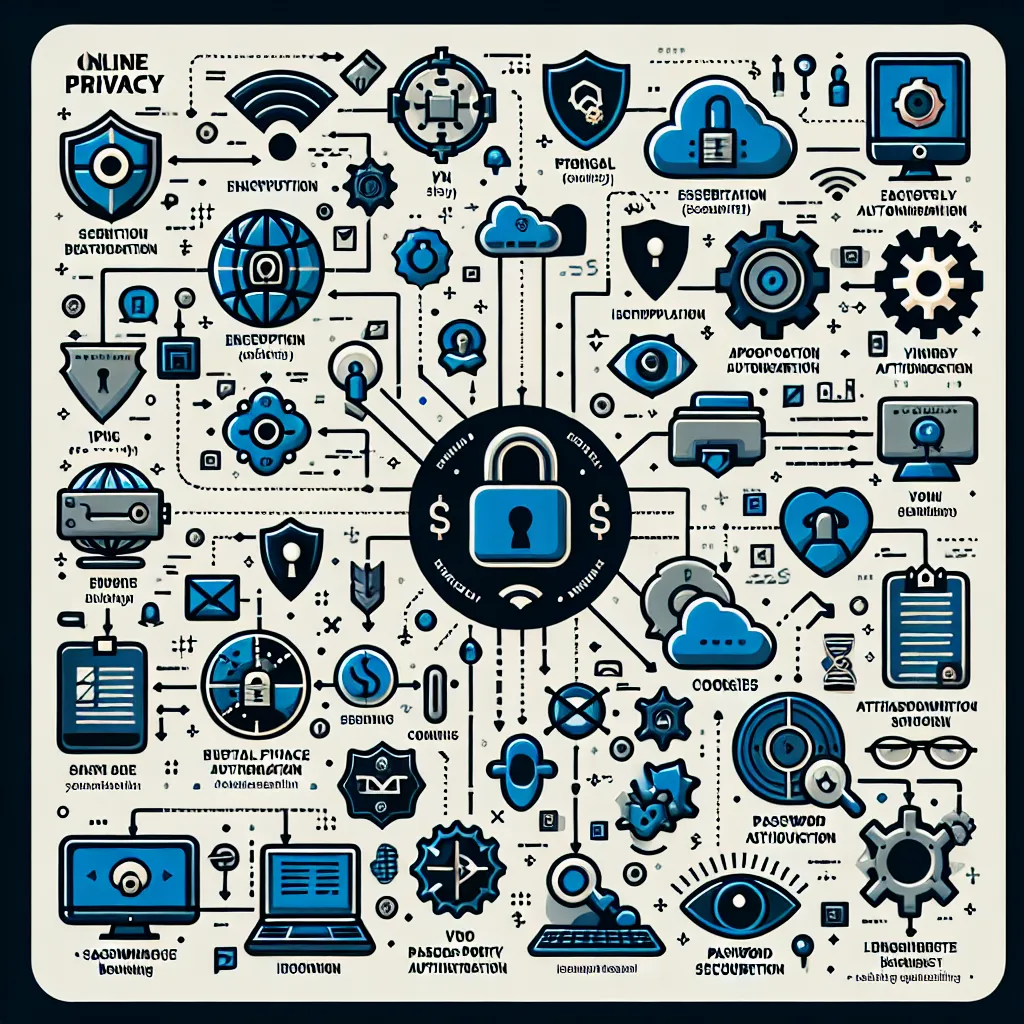In recent years, the topic of online privacy has become increasingly prevalent in IELTS Speaking tests. As digital technology continues to shape our daily lives, examiners are keen to assess candidates’ ability to articulate their experiences and opinions on this crucial subject. This article will guide you through answering questions related to “Describe a time when you had to navigate online privacy concerns” in your IELTS Speaking exam, providing sample answers and valuable tips to help you achieve a high band score.
Nội dung bài viết
- Part 1: Introduction and Interview
- Q: How important is online privacy to you?
- Q: Have you ever had concerns about your online privacy?
- Part 2: Long Turn (Cue Card)
- Sample Answer (Band 8-9)
- Follow-up Questions
- Part 3: Two-way Discussion
- Q: How do you think the concept of privacy has changed with the rise of social media?
- Q: Do you believe that increased online privacy measures could hamper technological innovation?
- Key Vocabulary and Phrases for High Scores
- Examiner’s Advice
Part 1: Introduction and Interview
In this section, the examiner may ask you general questions about online privacy. Here are some possible questions and sample answers:
Q: How important is online privacy to you?
Band 6-7 Answer:
Online privacy is quite important to me. I try to be careful about what information I share on the internet, especially on social media platforms. I think it’s necessary to protect personal data from potential misuse.
Band 8-9 Answer:
I consider online privacy to be absolutely crucial in today’s digital age. With the increasing prevalence of data breaches and cyber threats, I’m extremely cautious about my digital footprint. I meticulously manage my privacy settings on all platforms and regularly update my passwords to ensure the utmost protection of my personal information.
Q: Have you ever had concerns about your online privacy?
Band 6-7 Answer:
Yes, I have. There was a time when I noticed some strange advertisements on my social media feed that seemed to be based on my recent online searches. It made me feel a bit uncomfortable and worried about how my data was being used.
Band 8-9 Answer:
Absolutely. I’ve had numerous instances where I’ve been acutely aware of potential privacy breaches. One particularly alarming situation occurred when I received targeted advertisements for products I had only discussed verbally, never having searched for them online. This eye-opening experience made me profoundly conscious of the extent to which our online activities are monitored and exploited for commercial purposes.
 Online privacy concerns
Online privacy concerns
Part 2: Long Turn (Cue Card)
Now, let’s focus on the main topic. Here’s a sample cue card you might encounter:
Describe a time when you had to navigate online privacy concerns
You should say:
- What the situation was
- When and where it happened
- What actions you took
- And explain how you felt about the experience
Sample Answer (Band 8-9)
I’d like to share an experience I had last year when I encountered a significant online privacy concern. The situation arose when I was using a popular social media platform and noticed some unsettling anomalies in my account activity.
It all began on a Tuesday evening while I was at home, casually browsing through my social media feed. I suddenly received a notification about a login attempt from an unfamiliar location. This immediately set off alarm bells in my mind, as I hadn’t traveled recently or used any new devices.
Taking swift action, I immediately changed my password and enabled two-factor authentication. I also meticulously reviewed my account’s privacy settings, ensuring that my personal information was visible only to my trusted connections. Furthermore, I took the proactive step of logging out of all devices and carefully examining my recent account activity for any suspicious actions.
This experience left me feeling both vulnerable and empowered. On one hand, I was deeply unsettled by the realization of how easily my online privacy could be compromised. It was a stark reminder of the ever-present threats in the digital world. However, I also felt a sense of empowerment from taking control of my online security. This incident served as a wake-up call, prompting me to be more vigilant about my digital footprint and to stay informed about the latest online security measures.
Overall, this experience significantly altered my approach to online privacy. It reinforced the importance of constantly updating security measures and being proactive in protecting personal information in our increasingly interconnected world.
Follow-up Questions
- How did this experience change your online behavior?
Band 6-7 Answer:
After this experience, I became more careful about what I share online. I started using stronger passwords and checking my privacy settings more often. I also became more aware of the risks of using public Wi-Fi networks.
Band 8-9 Answer:
This experience fundamentally transformed my online behavior. I’ve become hyper-vigilant about my digital footprint, meticulously managing my online presence. I now use a password manager to generate and store complex, unique passwords for each account. Additionally, I’ve adopted a skeptical approach to third-party applications, thoroughly vetting their privacy policies before granting access to my data. I’ve also invested in a reputable VPN service to encrypt my internet connection, especially when using public Wi-Fi networks.
- Do you think companies are doing enough to protect user privacy?
Band 6-7 Answer:
I think some companies are trying, but many could do more. There have been a lot of data breaches in recent years, which shows that user privacy isn’t always a top priority for businesses. I believe companies should be more transparent about how they use our data.
Band 8-9 Answer:
While some companies have made commendable strides in enhancing user privacy, I believe there’s still a significant gap between current practices and ideal standards. Many corporations prioritize data monetization over user privacy, often burying crucial information in lengthy, convoluted terms of service. I firmly believe that companies should adopt a ‘privacy by design’ approach, integrating robust data protection measures into their products and services from the ground up. Furthermore, there’s an urgent need for more stringent regulations and proactive enforcement to hold companies accountable for safeguarding user data.
Part 3: Two-way Discussion
In this section, the examiner will ask more abstract questions related to online privacy. Here are some potential questions and sample answers:
Q: How do you think the concept of privacy has changed with the rise of social media?
Band 6-7 Answer:
I think social media has made privacy more complicated. People share a lot more personal information online now, sometimes without realizing the consequences. It’s become harder to keep things private because once something is posted, it can spread quickly and be seen by many people.
Band 8-9 Answer:
The advent of social media has fundamentally reshaped our understanding of privacy. We’ve transitioned from a world where personal information was largely confined to physical spaces to one where our lives are extensively documented online. This shift has blurred the lines between public and private spheres, creating a paradoxical situation where individuals simultaneously seek visibility and privacy.
Social media platforms have cultivated a culture of oversharing, where the impulse to broadcast personal experiences often overrides privacy concerns. This has led to a recalibration of social norms regarding what information is appropriate to share publicly. Moreover, the algorithmic nature of these platforms, which thrive on data collection and analysis, has introduced new dimensions to privacy concerns, extending beyond mere information disclosure to include behavioral tracking and prediction.
Consequently, privacy in the social media age has become a complex, multi-faceted issue, requiring individuals to navigate a delicate balance between self-expression and self-protection in an environment where the boundaries of personal information are constantly being negotiated and redefined.
Q: Do you believe that increased online privacy measures could hamper technological innovation?
Band 6-7 Answer:
This is a tricky question. On one hand, privacy is important for users, but on the other hand, some innovations rely on data to improve. I think there needs to be a balance between protecting privacy and allowing for technological advancements. Maybe companies can find ways to innovate without using so much personal data.
Band 8-9 Answer:
While there’s a prevailing notion that stringent privacy measures might impede technological progress, I believe this perspective is overly simplistic. In fact, I’d argue that robust privacy protections can actually catalyze innovation by fostering trust and encouraging responsible data practices.
Certainly, some data-driven innovations may face challenges under stricter privacy regimes. However, this constraint can spur creativity, pushing companies to develop more ingenious solutions that respect user privacy. For instance, techniques like differential privacy and federated learning have emerged as innovative ways to glean insights from data without compromising individual privacy.
Moreover, as privacy concerns become more prominent, there’s a growing market demand for privacy-enhancing technologies. This creates new avenues for innovation in areas such as encryption, anonymization techniques, and user-controlled data management systems.
Ultimately, I believe that aligning technological advancement with ethical data practices is not only possible but necessary for sustainable innovation. It encourages a more holistic approach to technological development, one that considers not just what can be done with data, but what should be done to protect users’ rights and maintain public trust.
Key Vocabulary and Phrases for High Scores
To enhance your IELTS Speaking performance when discussing online privacy concerns, consider using these sophisticated terms and phrases:
-
Digital footprint /ˈdɪdʒɪtl ˈfʊtprɪnt/ (noun): The trail of data you create while using the Internet.
Example: “I’m very conscious of my digital footprint and try to minimize the personal information I share online.” -
Data breach /ˈdeɪtə briːtʃ/ (noun): An incident where information is stolen or taken from a system without the knowledge or authorization of the system’s owner.
Example: “The recent data breach at the company exposed millions of users’ personal information.” -
Encryption /ɪnˈkrɪpʃn/ (noun): The process of converting information or data into a code to prevent unauthorized access.
Example: “End-to-end encryption ensures that only the intended recipients can read our messages.” -
Cybersecurity /ˌsaɪbəsɪˈkjʊərəti/ (noun): The practice of protecting systems, networks, and programs from digital attacks.
Example: “Investing in robust cybersecurity measures is crucial for any organization handling sensitive data.” -
Privacy settings /ˈprɪvəsi ˈsetɪŋz/ (noun): Options that allow a user to control who can see their information or content on a website or app.
Example: “I regularly review and update my privacy settings on social media platforms.” -
Data mining /ˈdeɪtə ˈmaɪnɪŋ/ (noun): The process of analyzing large databases to generate new information and patterns.
Example: “Many companies engage in data mining to gain insights into consumer behavior.” -
To safeguard /ˈseɪfɡɑːd/ (verb): To protect something from harm or damage.
Example: “It’s essential to take proactive measures to safeguard our personal information online.” -
Vigilant /ˈvɪdʒɪlənt/ (adjective): Keeping careful watch for possible danger or difficulties.
Example: “We must remain vigilant about potential threats to our online privacy.”
 Online privacy vocabulary
Online privacy vocabulary
Examiner’s Advice
To achieve a high band score when discussing online privacy concerns in your IELTS Speaking test, consider the following tips:
-
Demonstrate critical thinking: Show that you can analyze the complexities of online privacy issues from multiple perspectives.
-
Use relevant vocabulary: Incorporate topic-specific terms and phrases naturally in your responses.
-
Provide personal examples: Relate the topic to your own experiences to make your answers more authentic and engaging.
-
Structure your answers: Organize your thoughts logically, especially in Part 2, to ensure a coherent and well-developed response.
-
Show awareness of current issues: Stay informed about recent developments in online privacy to provide up-to-date and relevant answers.
-
Practice fluency: Work on speaking smoothly and confidently, minimizing hesitations and filler words.
-
Extend your answers: In Part 3, aim to discuss ideas in depth, considering causes, effects, and potential solutions to privacy concerns.
By following these guidelines and using the sample answers as inspiration, you’ll be well-prepared to tackle questions about online privacy concerns in your IELTS Speaking test. Remember, the key to success is not just knowing what to say, but how to say it effectively and confidently.
For more IELTS Speaking practice, you might find it helpful to explore topics like adapting to new circumstances due to technology or navigating difficult online conversations. These related subjects can broaden your understanding of digital communication and help you prepare for a wider range of potential speaking topics.


